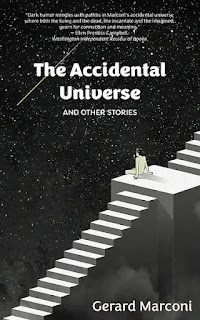Gerard Marconi is the author of the new story collection The Accidental Universe and Other Stories. His other books include Gods & Heroes: Baltimore Stories. He taught humanities and fine arts at the college level, and his work has appeared in a variety of publications, including The Chattahoochee Review.
Q: How was your new book’s title chosen, and what does it signify for you?
A: The acknowledgment page in the book refers to an astrophysicist at Harvard, Alan Lightman, who wrote a book in 2013 saying that we live in an accidental universe. I thought it would make a great title I could use for a story or a book. It had to do with the conclusion in the 21st century among physicists that there were no universal physical laws.
This raises all kinds of questions. I was looking for a unifying theme, and it was how unintended consequences affect our lives. How do you deal with these situations? It’s a source of a lot of human suffering. It raises the question: What is the meaning of life?
Q: So how do your characters answer that?
A: It depends on the individual characters. In the last story, "The Accidental Universe," one of the three narrators is preparing for death. He doesn’t believe in a traditional God. He quotes Socrates about what happens after death.
But my own thoughts come through. There are no easy answers.
Q: How long did it take to write the stories in your new collection?
A: There’s a term for this—a “curated collection.” A mix of older and newer. With some of them, I went back and updated a few incidentals. It took a year.
Q: Some of the stories are in the form of one-act plays--why did you decide to use this format?
A: I spent 20 years in theater at the college level, and I always wanted the time to write plays. I got a master’s in humanities and ended up teaching art history. The stories combine these backgrounds. I said, Why can’t I include one-act plays? One of them, “Rapture,” was given a reading in Baltimore!
Q: How did you choose the order in which the stories would appear in the book?
A: It’s roughly chronological order. One of the plays I wrote for this collection, “In the Beginning,” is the first one. I wanted to get readers used to the idea. The play goes back to the beginning, giving it a humorous twist. The second one, “A Blank Canvas,” focuses on [the artist Paul] Cezanne.
The final three or four stories deal with more contemporary issues.
Q: The writer Ellen Prentiss Campbell said of the book, “Dark humor mingles with pathos in Marconi’s accidental universe where both the living and the dead, the incarnate and the imagined, yearn for connection and meaning.” What do you think of that description?
A: “Dark humor” can refer to comedy that makes fun of subjects that are generally taboo, like questioning religion or Shakespeare’s authorship, or the use of vulgarities.
“Pathos” comes from the Greek word for suffering. A lot of the characters are suffering. Pathos was a way of stirring up people’s emotions. I was trying to be controversial, but not turn people off.
Q: What are you working on now?
A: Another collection with similar themes.
--Interview with Deborah Kalb


No comments:
Post a Comment